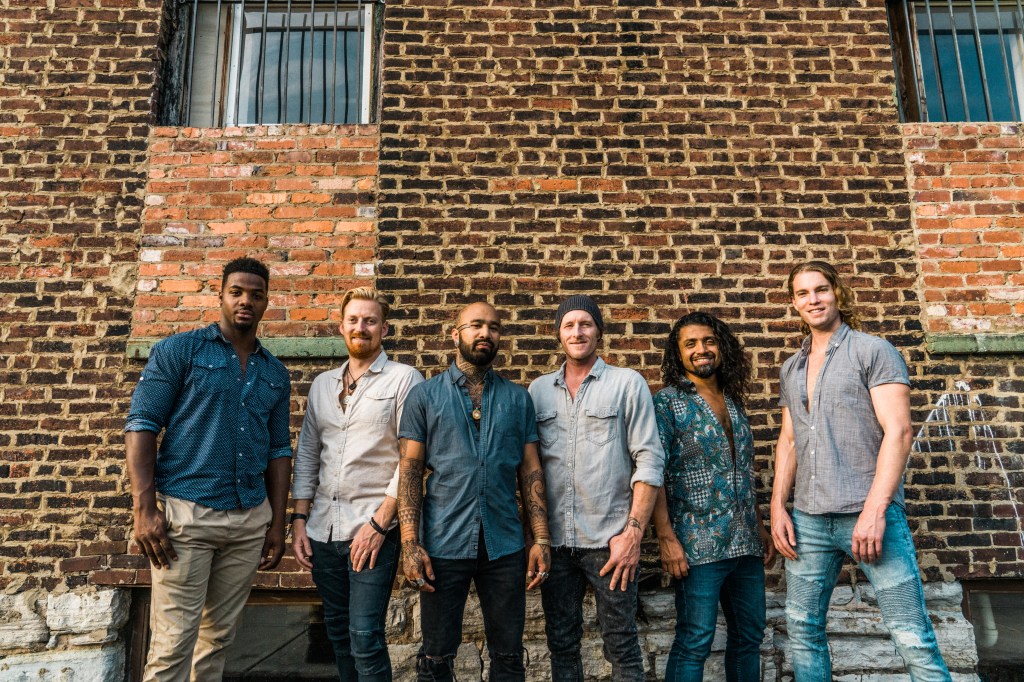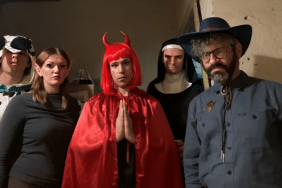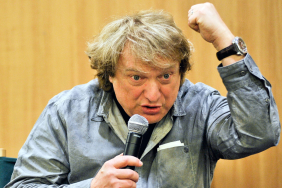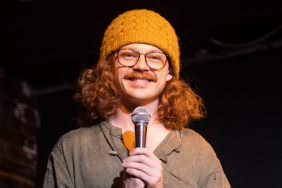Hoka, the latest Nahko and Medicine For the People album, came out in mid-2016. In late-2017, Nahko Bear released his first solo LP, My Name Is Bear. A new Medicine For the People is currently in the works, but Nahko and co. will take a break to head this way for Bluesfest and a run of headline dates.
Australian audiences have been instinctively drawn to the band’s music and humanitarian, eco-conscious message ever since their first visit six years ago. While not afraid to address social injustices and speak honestly about environmental perils, Bear has always expressed affection for the time he’s living in. Faith in the power of music is central to his optimistic outlook. This faith hasn’t shifted, but the band’s music is undergoing some changes.
Bear speaks to Music Feeds about the future of the band.
Music Feeds: Are you preparing to initiate a new phase of the band’s creative journey with the next Medicine For the People record?
Nahko Bear: I’m in a more mature place in just acknowledging how much musicality I’ve learnt in the last three years – honing in on further developed concepts. Songwriting is so funny. You can go to school for it, you can go learn from doing sessions with people all the time, but my way was so organic and had no structure to it that somehow it ended up working for me in a way that attracted people’s interest.
Over the years, since the last band record, I’ve just learnt so much more about myself as a songwriter, how I am, about what I’m open to.
MF: Medicine For The People is a seven-piece band, including yourself. You’re the main songwriter, but how close-knit does the band feel in the studio?
NB: We’ve done support tours for the last two years for the majority of the summers so our musicianship together has grown quite a lot as well as our communication, which is always key.
I’ve got a great group of guys. We’ve added some people and I went through a bit of transition team-wise as well, so I’ve got a new team working with me as well. I feel really confident in the direction we’re going. As an artist it just feels like capturing the essence of what I’m going through at this
time of my life in reflection to the world stage.
MF: My Name Is Bear is a very personal release. It consists of songs you wrote between the ages of 18-21 years old, prior to forming the band. You’ve said it was essential for you to get those songs out before moving on to some more potent statements on the next band record. Did making, releasing and touring the album have the desired effect?
NB: Oh yeah for sure. My Name Is Bear was a great footnote in a time where we were in between making another band record. We were in between a lot of things team-wise, getting set up for this particular undertaking. I was going through massive transformations myself. To put that out, it brought up a lot for me as well as set me up and the band up for taking a look at something that was old and giving it fresh perspective.
MF: Hoka was of epic proportions – a 19-track, 80 minute album with a handful of short interludes and spoken segments. The songwriting encompassed roots rock, folk, hip hop and pop rock. Several songs were boosted by dynamic band arrangements featuring trumpet, violin and expressive drumming. Are you going to keep employing such sweeping stylistic breadth?
NB: This record I’m working on now, I’ve approached it very differently. Much more inquisitively, actually. I’ve looked at Hoka and seen how fricking massive these songs were and how they went on and on and on. There’s nothing wrong with that and I’ve always marvelled at my own ability to just make a song keep going somehow. I’ve looked at it and gone, OK, well this song didn’t want to be done yet. I wasn’t really attaching it to a style either; it’d just come out like this. When we work it out as a band it would just come out like that.
But with this body of work I’m like, oh I want to make this kind of song, and I’ll start sketching it out. I’ve found myself a lot of the time the last couple of months asking people, “What do you feel? What colours do you see when you hear this?” So it’s getting more psychedelic in some sense when I look into the overall feeling that is derived from hearing a song, whether it’s on acoustic guitar or has full band on it or has a programmed thing.
I look at Hoka and go, dang, those songs were long as fuck. They cross genres, but somehow it all fits into this thing.
MF: You’re a prolific lyricist, which plays a part in the extended song lengths. Hoka covered themes of personal liberation, accountability and spirituality as well as acknowledging our connection to the planet and commenting on civil imbalance and injustice. What do you endeavour to get from writing lyrics? Is about communicating ideas that you think are significant or is it more of a personal thing?
NB: I have such a different respect for the songs as their own entities now. What is the song trying to tell me? Where does it want to go? Is it a question? Do I have a solution? Is it just a story with an idea?
It’s more about what do I want to leave myself with when I finish the song as opposed to what will the listener feel once it’s over. So it’s really personal shit. Once it goes in the ones and zeros or once you put it on a disc, it’s out there forever.
MF: You have attracted some very devoted followers. Members of the Medicine Tribe tend to be deeply invested in your music. Does that apply pressure when you’re writing?
NB: I tend not to think about anybody else. If I can’t convince myself of something then I’m not going to convince anybody else of anything. If I step back objectively I think, what am I trying to tell the world? But it always comes back to myself – what the hell are you trying to say to yourself, buddy? That’s really the key.
–
Nahko and Medicine For the People will play Byron Bay Bluesfest this April. The band have also announced a trip of headline sideshows in Brisbane, Sydney and Melbourne. Dates and details below.
Nahko And Medicine For The People Bluesfest Sideshows
Wednesday, 17th April 2019
The Triffid, Brisbane
Tickets: The Triffid
Saturday, 20th April 2019
Metro Theatre Sydney
Tickets: Metro
Sunday, 21st April 2019
170 Russell, Melbourne
Tickets: Moshtix












